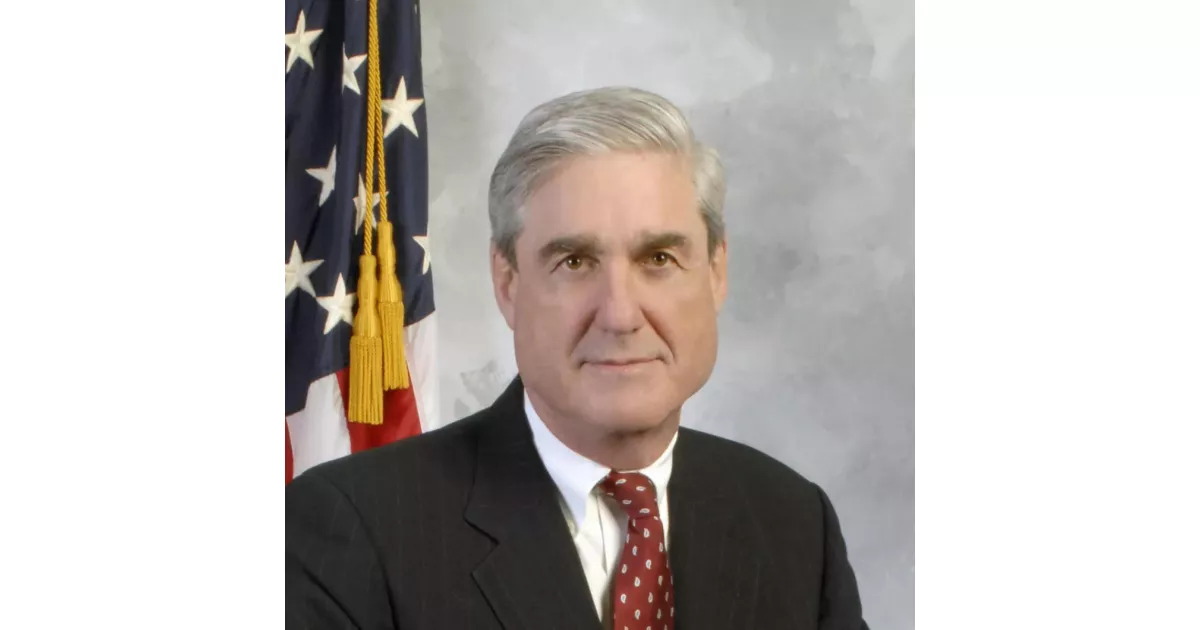1916: Birth of Robert Swan Mueller Jr., Robert Mueller's Father
Robert Swan Mueller Jr., Robert Mueller's father, was born in 1916.
1920: Alice C. Truesdale, Robert Mueller's Mother, is Born
Alice C. Truesdale, who would later become Robert Mueller's mother, was born in 1920.
August 7, 1944: Robert Swan Mueller III was born
Robert Swan Mueller III was born on August 7, 1944, in Manhattan, New York City.
1962: Mueller Graduates High School as Top Athlete
Robert Mueller graduated from St. Paul's School in Concord, New Hampshire, in 1962, receiving the Gordon Medal as the school's top athlete.
September 1966: Mueller Marries Ann Cabell Standish
Robert Mueller married Ann Cabell Standish in September 1966 at St. Stephen's Episcopal Church in Sewickley, Pennsylvania.
1966: Mueller Earns Bachelor's Degree from Princeton
Robert Mueller graduated from Princeton University with a Bachelor of Arts in politics in 1966, having written his senior thesis on "Acceptance of Jurisdiction in the South West Africa Cases."
1967: Mueller's Lacrosse Teammate Dies in Vietnam War
In 1967, David Spencer Hackett, a Marine Corps first lieutenant and Robert Mueller's lacrosse teammate from Princeton, was killed in action in Vietnam's Quảng Trị province. This event profoundly impacted Mueller, influencing his decision to enlist.
1967: Mueller Completes Master's Degree at NYU
In 1967, Robert Mueller obtained a Master of Arts in international relations from New York University.
December 11, 1968: Mueller Receives Bronze Star for Valor
On December 11, 1968, Robert Mueller was awarded the Bronze Star with "V" device for his bravery in combat during Operation Scotland II in Vietnam. He rescued a wounded Marine under enemy fire, demonstrating exceptional courage in a situation where his platoon suffered numerous casualties.
1968: Mueller Undergoes Officer Training for Marine Corps
After recovering from a knee injury, Robert Mueller started his officer training in 1968 at Parris Island, encompassing Officer Candidate School, Army Ranger School, and Army jump school.
1968: Mueller Enlists in the Marine Corps
Robert Mueller joined the United States Marine Corps in 1968.
April 1969: Mueller Wounded in Action
During his service in Vietnam, Robert Mueller sustained a gunshot wound to his thigh in April 1969.
June 1969: Mueller Completes Tour in Vietnam
Robert Mueller concluded his tour of duty in Vietnam in June 1969, having served with distinction and receiving multiple commendations for his bravery and leadership.
August 1970: Mueller Leaves Active Duty in the Marine Corps
Robert Mueller ended his active duty in the United States Marine Corps in August 1970, leaving with the rank of captain.
1972: J. Edgar Hoover Dies, Prompting Term Limit for Future FBI Directors
Following the death of J. Edgar Hoover in 1972, Congress implemented a statutory 10-year term limit for all future FBI Directors.
1973: Mueller Begins Legal Career
Following his graduation from law school, Robert Mueller embarked on his legal career in 1973, joining the law firm Pillsbury, Madison and Sutro in San Francisco as a litigator.
1973: Mueller Graduates Law School
Robert Mueller graduated from the University of Virginia School of Law in 1973, where he had been a member of the Virginia Law Review.
1976: Mueller Begins Public Service as U.S. Attorney
Robert Mueller transitioned into public service in 1976, starting his tenure in the United States Attorney's office.
1982: Mueller Moves to U.S. Attorney's Office in Boston
In 1982, Robert Mueller relocated to Boston to work in the U.S. Attorney's Office for Massachusetts, where he served as an Assistant United States Attorney. In this capacity, he focused on investigating and prosecuting cases related to financial fraud, terrorism, public corruption, drug trafficking, and international money laundering.
1986: Government Begins Investigation into BCCI
In 1986, the government initiated an investigation into the activities of the Bank of Credit and Commerce International (BCCI). This investigation, which would later be made public by Robert Mueller, focused on uncovering potential financial misconduct and illegal activities within the bank.
1989: Mueller Returns to Department of Justice
In 1989, Robert Mueller rejoined the United States Department of Justice, working as an assistant to Attorney General Dick Thornburgh. He also served as acting deputy attorney general during this time. His work involved collaborating with individuals like James Baker on issues related to national security.
1990: Mueller Appointed U.S. Assistant Attorney General
Robert Mueller was appointed as the United States Assistant Attorney General in 1990, taking charge of the United States Department of Justice Criminal Division. During this period, he oversaw significant prosecutions, including those of Panamanian leader Manuel Noriega, the individuals involved in the Pan Am Flight 103 bombing (Lockerbie bombing), and the notorious Gambino crime family boss John Gotti.
1991: Mueller Announces Investigation into BCCI
Robert Mueller, in 1991, made a public announcement about the government's ongoing investigation into the Bank of Credit and Commerce International (BCCI), an investigation that had been underway since 1986. This public disclosure garnered significant media attention. In the same year, Mueller was honored with a fellowship from the American College of Trial Lawyers, a testament to his legal expertise and accomplishments.
1993: Partner at Hale and Dorr
In 1993, Robert Mueller became a partner at the law firm Hale and Dorr in Boston, where he specialized in white-collar crime litigation.
1995: Senior Litigator
Robert Mueller returned to public service in 1995 as a senior litigator in the homicide section of the District of Columbia United States Attorney's Office.
1998: U.S. Attorney for the Northern District of California
In 1998, Robert Mueller was appointed U.S. Attorney for the Northern District of California, a position he held until 2001.
2000: Mueller Diagnosed with Prostate Cancer
Robert Mueller was diagnosed with prostate cancer in 2000.
July 5, 2001: Nomination for FBI Director
On July 5, 2001, President George W. Bush nominated Robert Mueller for the position of FBI director. Despite being considered the front-runner, Mueller faced competition from two other candidates.
August 2, 2001: Confirmation as FBI Director
The Senate unanimously confirmed Robert Mueller as FBI director on August 2, 2001, with a vote of 98-0 in favor of his appointment.
September 4, 2001: Became FBI Director
Robert Mueller officially became the FBI director on September 4, 2001, just one week before the September 11 attacks.
2001: Mueller Becomes FBI Director
In 2001, Robert Mueller began his term as the sixth director of the Federal Bureau of Investigation (FBI).
2001: Mueller's FBI Confirmation Delayed Due to Cancer Treatment
Robert Mueller's 2001 Senate confirmation hearings for FBI director were postponed for several months. This delay occurred because he was undergoing treatment for prostate cancer, ensuring he received a favorable prognosis before assuming the position.
2001: End of Term as U.S. Attorney
Robert Mueller's term as U.S. Attorney for the Northern District of California ended in 2001.
February 11, 2003: Testimony to the Senate Select Committee on Intelligence
On February 11, 2003, Robert Mueller testified before the Senate Select Committee on Intelligence, where he informed the public about the threat of terrorism from seven state sponsors, including Iraq. He highlighted concerns about Saddam Hussein potentially supplying terrorists with weapons of mass destruction.
February 2003: Warning from Coleen Rowley
In February 2003, FBI Special Agent Coleen Rowley wrote a letter to Robert Mueller expressing concerns that the FBI wouldn't be able to handle the potential surge in terrorism following an attack on Iraq. She urged Mueller to share these concerns with the President and Attorney General.
March 10, 2004: Refusal to Renew Warrantless Wiretapping Program
On March 10, 2004, while Attorney General John Ashcroft was hospitalized, White House officials attempted to persuade him to renew a warrantless wiretapping program deemed unconstitutional by the DOJ. Ashcroft refused to sign the renewal.
March 12, 2004: Compromise on Wiretapping Program
On March 12, 2004, following threats of resignation from Robert Mueller and James Comey, the President agreed to modify the warrantless wiretapping program to address their concerns and those of Ashcroft.
2004: Induction into the Ranger Hall of Fame
Robert Mueller was inducted into the Ranger Hall of Fame in 2004.
2007: Passing of Robert Mueller's Parents
Robert Mueller's parents, Alice C. Truesdale and Robert Swan Mueller Jr., both passed away in 2007.
2009: Mueller Expresses Pride in Marine Corps Service
In 2009, Robert Mueller shared that he remained most proud of being deemed worthy of leading fellow Marines, highlighting the significance of his Marine Corps service in his life.
May 2011: Request for Term Extension
In May 2011, President Barack Obama asked Robert Mueller to extend his term as FBI Director for an additional two years beyond the standard 10-year term.
July 27, 2011: Senate Approval for Term Extension
The Senate unanimously approved President Obama's request to extend Robert Mueller's term as FBI Director on July 27, 2011.
September 4, 2011: Original End of FBI Term
Robert Mueller's original 10-year term as FBI Director was set to expire on September 4, 2011.
June 2013: Defense of NSA Surveillance Programs
In June 2013, Robert Mueller testified before the House Judiciary Committee, defending the NSA surveillance programs and stating that they could have potentially prevented the September 11 attacks. He asserted that the programs complied with U.S. law and constitutional rights.
September 4, 2013: End of FBI Directorship
On September 4, 2013, Robert Mueller was succeeded by James Comey as FBI Director.
2013: Consulting Professor and Lecturer at Stanford University
After leaving the FBI in 2013, Robert Mueller took on roles as a consulting professor and distinguished lecturer at Stanford University for a year, focusing on cybersecurity issues.
2013: Mueller's Tenure as FBI Director Ends
Robert Mueller's time as the FBI director ended in 2013.
2014: Partner at WilmerHale
Robert Mueller joined the law firm WilmerHale as a partner in their Washington office in 2014.
January 2016: Settlement Master in Volkswagen Emissions Scandal
In January 2016, Robert Mueller was appointed Settlement Master in the U.S. consumer litigation regarding the Volkswagen emissions scandal.
October 19, 2016: External Review of Booz Allen Hamilton
Robert Mueller initiated an external review of government contractor Booz Allen Hamilton on October 19, 2016, following the indictment of Harold T. Martin III for significant data theft from the National Security Agency.
2016: Allegations of Russian Interference in the U.S. Presidential Election
In 2016, during the U.S. presidential election, allegations arose concerning Russian interference, sparking investigations and raising concerns about election integrity.
2016: Thayer Award Recipient
Robert Mueller was honored with the 2016 Thayer Award from the United States Military Academy in recognition of his public service.
April 6, 2017: Special Master for Takata Airbag Case
On April 6, 2017, Robert Mueller was appointed Special Master to oversee the disbursement of funds to automakers and consumers affected by faulty Takata airbags.
May 11, 2017: Volkswagen Emissions Scandal Reaches $11.2 Billion in Settlements
As of May 11, 2017, the Volkswagen emissions scandal, in which Robert Mueller served as Settlement Master, had resulted in $11.2 billion in customer settlements.
May 16, 2017: Meeting with President Trump
On May 16, 2017, Robert Mueller met with President Trump to discuss the FBI and provide input on selecting a new FBI Director. While initially reported as an interview for Mueller to potentially resume the role, he was ineligible due to term limits and lacked interest in returning.
May 17, 2017: Mueller Appointed Special Counsel
On May 17, 2017, Robert Mueller was appointed by Deputy Attorney General Rod Rosenstein to serve as special counsel. His role involved overseeing an investigation into Russian interference in the 2016 U.S. presidential election and other related issues.
May 23, 2017: Mueller Deemed Ethically Fit to Serve as Special Counsel
On May 23, 2017, experts on ethics at the U.S. Department of Justice announced that Robert Mueller was ethically able to serve in the role of special counsel.
June 14, 2017: Reports Surface of Mueller Investigating Trump for Obstruction of Justice
On June 14, 2017, The Washington Post reported that Mueller's office was investigating whether President Trump had obstructed justice in relation to the investigation into Russian interference in the election.
June 2017: Baker Award Recipient
In June 2017, Robert Mueller received the Baker Award from the Intelligence and National Security Alliance, a nonprofit organization, for his contributions to intelligence and national security.
June 19, 2017: Shielded from Civil Liability in Arar v. Ashcroft
On June 19, 2017, the Supreme Court shielded Robert Mueller, along with John Ashcroft and others, from civil liability in the case of Arar v. Ashcroft. This case pertained to the post-9/11 detention of Muslims under policies implemented at the time.
July 21, 2017: Brennan Voices Support for Mueller, Urges Congressional Resistance
Former CIA director John Brennan expressed his support for Mueller at the Aspen security conference on July 21, 2017, and encouraged members of Congress to resist any attempts by Trump to fire him.
October 30, 2017: Mueller Charges Manafort and Gates with Financial Crimes and Conspiracy
Mueller filed charges against Paul Manafort and Rick Gates, former Trump campaign officials, on October 30, 2017. The charges included money laundering, FARA violations, and conspiracy against the U.S.
December 1, 2017: Flynn Admits to Lying to FBI, Agrees to Cooperate
On December 1, 2017, Michael Flynn, former national security adviser, entered into a plea agreement, admitting guilt to charges of making false statements to the FBI regarding his communications with Russian ambassador Sergey Kislyak.
December 20, 2017: Senator Warner Warns of Constitutional Crisis if Trump Fires Mueller
Senator Mark Warner, during a speech before the Senate on December 20, 2017, cautioned that dismissing Mueller would lead to a constitutional crisis, particularly after investigator Peter Strzok was removed due to allegations of bias.
February 16, 2018: Mueller Indicts Russians for Election Interference
Robert Mueller indicted 13 Russian individuals and 3 Russian companies on February 16, 2018, for their alleged involvement in a scheme to deceive American citizens by disseminating Russian propaganda.
February 20, 2018: Mueller Charges van der Zwaan with False Statements
On February 20, 2018, attorney Alex van der Zwaan was charged by Robert Mueller with making false statements during the course of the Russia investigation.
June 22, 2018: Senator Warner Hosts Fundraiser, Hints at Explosive Information
On June 22, 2018, at a fundraising event he hosted, Senator Mark Warner suggested that he possessed sensitive information known only to himself and Robert Mueller.
December 18, 2018: Report: Russian Disinformation Teams Targeted Mueller
An article published by The Washington Post on December 18, 2018, revealed that Russian disinformation teams had targeted Robert Mueller, according to a report prepared for the U.S. Senate.
March 22, 2019: Mueller Submits Report to Attorney General
Robert Mueller submitted his report to Attorney General William Barr on March 22, 2019, regarding the investigation into Russian interference in the 2016 U.S. presidential election.
May 29, 2019: Mueller Retires, Speaks Publicly on Report
On May 29, 2019, Mueller announced his retirement as special counsel and made his first public statement regarding the report, stating, "The report is my testimony."
July 17, 2019: Mueller's Congressional Testimony Postponed
Robert Mueller's scheduled testimony before two House committees, originally set for July 17, 2019, was postponed to July 24.
July 24, 2019: Mueller Testifies Before Congress
On July 24, 2019, Robert Mueller testified before two congressional committees regarding his report on Russian interference in the 2016 election. He largely stuck to the report's findings and avoided answering questions outside its scope. Mueller acknowledged concerns about ongoing foreign interference, characterizing it as a significant threat. While his testimony was widely viewed, it garnered lower TV ratings compared to other Trump administration hearings.
September 2019: Report Suggests Trump May Have Misled Mueller
In September 2019, reports emerged suggesting that President Trump might have provided false information to Mueller regarding his campaign's communication with WikiLeaks. This revelation stemmed from redacted grand jury materials within the Mueller report.
October 2019: Return to WilmerHale
It was announced in October 2019 that Robert Mueller, alongside James L. Quarles and Aaron Zebley, would return to WilmerHale to resume private practice.
July 11, 2020: Op-Ed Defending Roger Stone Conviction
On July 11, 2020, Robert Mueller authored an op-ed in The Washington Post, asserting that Roger Stone remained a convicted felon "rightly so" after receiving clemency from the President. Mueller defended his investigation in the op-ed.
June 2021: Mueller to Co-Teach Course on Special Counsel Role
In June 2021, the University of Virginia Law School revealed that Robert Mueller would co-instruct a course titled "The Mueller Report and the Role of the Special Counsel." This six-session course, scheduled for the fall semester, would also feature contributions from three of Mueller's colleagues from the Russia investigation.
July 2024: Publication of "Interference: The Inside Story of Trump, Russia, and the Mueller Investigation" Announced
In July 2024, Simon & Schuster announced the upcoming release of "Interference: The Inside Story of Trump, Russia, and the Mueller Investigation." This book, authored by key members of Mueller's investigative team, promised an inside look at the investigation. Robert Mueller himself contributed the book's introduction.
Mentioned in this timeline

Barack Obama the th U S President - was the...

George W Bush the rd U S President - is...

The White House located at Pennsylvania Avenue NW in Washington...
California is a U S state on the Pacific Coast...
Qatar is a country located on the Qatar Peninsula in...

San Francisco is a major commercial financial and cultural hub...
Trending
44 minutes ago Alaska Airlines Expands International Flights from St. Louis; Pilot Wage Updates.

44 minutes ago Kasatkina vs. Siegemund: 2026 WTA Dubai First Round Preview and Prediction
44 minutes ago Sorana Cîrstea returns to WTA Top 30; highest ranked Romanian player in WTA.

45 minutes ago Victoria Mboko adjusts to favorite status after Doha finals defeat in Qatar Open.

2 hours ago Cristian vs. Mboko: WTA Dubai 2026 Prediction, Odds and Match Preview

2 hours ago Clara Tauson Faces Sofia Kenin at WTA Dubai: Predictions and Betting Odds
Popular

Kid Rock born Robert James Ritchie is an American musician...
Randall Adam Fine is an American politician a Republican who...

Pam Bondi is an American attorney lobbyist and politician currently...

Barack Obama the th U S President - was the...
The Winter Olympic Games a major international multi-sport event held...

XXXTentacion born Jahseh Dwayne Ricardo Onfroy was a controversial yet...
